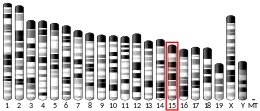POP1 (gene)
Ribonucleases P/MRP protein subunit POP1 is a protein that in humans is encoded by the POP1 gene.[5][6]
Function
POP1 is a protein subunit of two different small nucleolar ribonucleoprotein complexes: the endoribonuclease for mitochondrial RNA processing complex and the ribonuclease P complex. This protein is a ribonuclease that localizes to the nucleus and functions in pre-RNA processing.[7]
Clinical significance
POP1 is also an autoantigen in patients suffering from connective tissue diseases. Mutations in the POP1 gene result in severe anauxetic dysplasia.[8]
References
- GRCh38: Ensembl release 89: ENSG00000104356 - Ensembl, May 2017
- GRCm38: Ensembl release 89: ENSMUSG00000022325 - Ensembl, May 2017
- "Human PubMed Reference:". National Center for Biotechnology Information, U.S. National Library of Medicine.
- "Mouse PubMed Reference:". National Center for Biotechnology Information, U.S. National Library of Medicine.
- Pluk H, van Eenennaam H, Rutjes SA, Pruijn GJ, van Venrooij WJ (Apr 1999). "RNA-protein interactions in the human RNase MRP ribonucleoprotein complex". RNA. 5 (4): 512–24. doi:10.1017/S1355838299982079. PMC 1369778. PMID 10199568.
- Lygerou Z, Pluk H, van Venrooij WJ, Seraphin B (Jan 1997). "hPop1: an autoantigenic protein subunit shared by the human RNase P and RNase MRP ribonucleoproteins". EMBO J. 15 (21): 5936–48. doi:10.1002/j.1460-2075.1996.tb00980.x. PMC 452370. PMID 8918471.
- "Entrez Gene: POP1 processing of precursor 1, ribonuclease P/MRP subunit (S. cerevisiae)".
- Glazov, EA; Zankl, A; Donskoi, M; Kenna, TJ; Thomas, GP; Clark, GR; Duncan, EL; Brown, MA (Mar 2011). "Whole-Exome Re-Sequencing in a Family Quartet Identifies POP1 Mutations As the Cause of a Novel Skeletal Dysplasia". PLOS Genetics. 7 (3): e1002027. doi:10.1371/journal.pgen.1002027. PMC 3063761. PMID 21455487.
- Welting, Tim J M; van Venrooij Walther J; Pruijn Ger J M (2004). "Mutual interactions between subunits of the human RNase MRP ribonucleoprotein complex". Nucleic Acids Res. England. 32 (7): 2138–46. doi:10.1093/nar/gkh539. PMC 407822. PMID 15096576.
Further reading
- Nomura N, Nagase T, Miyajima N, et al. (1995). "Prediction of the coding sequences of unidentified human genes. II. The coding sequences of 40 new genes (KIAA0041-KIAA0080) deduced by analysis of cDNA clones from human cell line KG-1". DNA Res. 1 (5): 223–9. doi:10.1093/dnares/1.5.223. PMID 7584044.
- Schmiedeknecht G, Büchler C, Schmitz G (1998). "A bidirectional promoter connects the p14.5 gene to the gene for RNase P and RNase MRP protein subunit hPOP1". Biochem. Biophys. Res. Commun. 241 (1): 59–67. doi:10.1006/bbrc.1997.7772. PMID 9405234.
- Dundr M, Olson MO (1999). "Partially processed pre-rRNA is preserved in association with processing components in nucleolus-derived foci during mitosis". Mol. Biol. Cell. 9 (9): 2407–22. doi:10.1091/mbc.9.9.2407. PMC 25507. PMID 9725903.
- Jiang T, Guerrier-Takada C, Altman S (2001). "Protein-RNA interactions in the subunits of human nuclear RNase P." RNA. 7 (7): 937–41. doi:10.1017/S1355838201010299. PMC 1370153. PMID 11455963.
- van Eenennaam H, van der Heijden A, Janssen RJ, et al. (2002). "Basic domains target protein subunits of the RNase MRP complex to the nucleolus independently of complex association". Mol. Biol. Cell. 12 (11): 3680–9. doi:10.1091/mbc.12.11.3680. PMC 60285. PMID 11694598.
- Andersen JS, Lyon CE, Fox AH, et al. (2002). "Directed proteomic analysis of the human nucleolus". Curr. Biol. 12 (1): 1–11. doi:10.1016/S0960-9822(01)00650-9. PMID 11790298. S2CID 14132033.
- Strausberg RL, Feingold EA, Grouse LH, et al. (2003). "Generation and initial analysis of more than 15,000 full-length human and mouse cDNA sequences". Proc. Natl. Acad. Sci. U.S.A. 99 (26): 16899–903. Bibcode:2002PNAS...9916899M. doi:10.1073/pnas.242603899. PMC 139241. PMID 12477932.
- Welting TJ, van Venrooij WJ, Pruijn GJ (2004). "Mutual interactions between subunits of the human RNase MRP ribonucleoprotein complex". Nucleic Acids Res. 32 (7): 2138–46. doi:10.1093/nar/gkh539. PMC 407822. PMID 15096576.
- Beausoleil SA, Jedrychowski M, Schwartz D, et al. (2004). "Large-scale characterization of HeLa cell nuclear phosphoproteins". Proc. Natl. Acad. Sci. U.S.A. 101 (33): 12130–5. Bibcode:2004PNAS..10112130B. doi:10.1073/pnas.0404720101. PMC 514446. PMID 15302935.
- Andersen JS, Lam YW, Leung AK, et al. (2005). "Nucleolar proteome dynamics". Nature. 433 (7021): 77–83. Bibcode:2005Natur.433...77A. doi:10.1038/nature03207. PMID 15635413. S2CID 4344740.
- Rual JF, Venkatesan K, Hao T, et al. (2005). "Towards a proteome-scale map of the human protein-protein interaction network". Nature. 437 (7062): 1173–8. Bibcode:2005Natur.437.1173R. doi:10.1038/nature04209. PMID 16189514. S2CID 4427026.
- Welting TJ, Kikkert BJ, van Venrooij WJ, Pruijn GJ (2006). "Differential association of protein subunits with the human RNase MRP and RNase P complexes". RNA. 12 (7): 1373–82. doi:10.1261/rna.2293906. PMC 1484433. PMID 16723659.
This article incorporates text from the United States National Library of Medicine, which is in the public domain.
This article is issued from Wikipedia. The text is licensed under Creative Commons - Attribution - Sharealike. Additional terms may apply for the media files.




